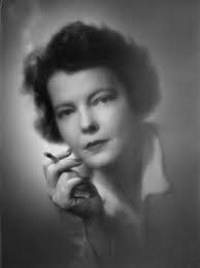Celebrating Women's History Month - Margaret Virginia (Margo) Jones
By Emily Banks Wooten
This email address is being protected from spambots. You need JavaScript enabled to view it.
(Editor’s Note: This is the third of a multi-part series celebrating Women’s History Month by recognizing the service, contributions and achievements of some of Polk County’s finest.)
 Margaret Virginia (Margo) Jones (Dec. 12, 1911-July 24, 1955) was born on Dec. 12, 1911 in Livingston, the second child of Richard Harper Jones and Martha Pearl Jones. After graduating from Livingston High School at the age of 15, Jones went to Girl’s Industrial College of Texas, now Texas Women’s University, earning a Bachelor of Arts degree in speech in 1932 and a master’s in psychology and education in 1933, completing her thesis on Henrik Ibsen.
Margaret Virginia (Margo) Jones (Dec. 12, 1911-July 24, 1955) was born on Dec. 12, 1911 in Livingston, the second child of Richard Harper Jones and Martha Pearl Jones. After graduating from Livingston High School at the age of 15, Jones went to Girl’s Industrial College of Texas, now Texas Women’s University, earning a Bachelor of Arts degree in speech in 1932 and a master’s in psychology and education in 1933, completing her thesis on Henrik Ibsen.
In 1934-35, she worked and studied at the Southwestern School of Theatre in Dallas and at the Pasadena Playhouse. In 1935, she traveled around the world seeing theater in Japan, China, India, Africa, England, France, Russia and New York. In 1936, she founded the Houston Community Players and directed the theater until 1942.
Jones had a gift for selecting plays, inspiring actors and casting just the right person for a role and had a natural ability for promotion and publicity. She earned national attention as a member of the National Theatre Conference and, in 1939, was named by STAGE Magazine as one of 12 outstanding theatre directors outside of New York, the only woman selected.
From 1942-44, she taught theater and directed plays at the University of Texas. In 1942, she discovered a play by an unknown playwright named Tennessee Williams and was entranced by his work. She promoted his work to everyone. Williams said, “She restored my faith in having some possible future as a playwright.” She directed his play “You Touched Me” at the Pasadena Playhouse, thus bringing him to the attention of national theatre critics.
In 1944, she directed Williams’ “The Purification” at the Pasadena Playhouse. During this time, she had been formulating an idea that would change the shape of theater in America. She wanted to establish a network of non-profit, professional resident theaters outside of New York theaters, presenting new plays and classics. She applied for, and was granted, a Rockefeller fellowship to study the possibility for repertory in America. Her survey convinced her that Dallas, with its metropolitan spirit and generous support of the arts, was a fertile field for founding such an organization.
In 1945, she arrived in Dallas and began her work there. She was the first to make professional use of the theater-in-the-round, in which spectators surround the stage. Her first successful Broadway play was Williams’ “The Glass Menagerie” which she co-directed. In 1947, she raised $40,000 by public subscription and began her first season in Dallas. The name of her local Theater ’47 was changed every year on New Year’s Eve to correspond with the new year.
Jones died on July 24, 1955, after a brief illness. Doctors said her death was caused by kidney failure which resulted from inhaling carbon tetrachloride fumes while the carpet in her Dallas apartment was being cleaned. Services were held in Dallas and in Livingston. She is buried in Forest Hill Cemetery in Livingston. A state historical marker stands in the 600 block of South Washington in Livingston where her childhood home was located. An additional state historical marker is at her gravesite.
Helen Sheehy, the author of “Margo: The Life and Theatre of Margo Jones,” spoke of Jones at the ceremony in which the second historical marker was dedicated.
“She was a combination of the romantic and the practical. She was the original, with a powerful, powerful vision. Margo’s will and personality literally changed the map of the American theater. She pioneered the American Theater Movement. She died at 43, surrounded by scripts and planning her next season. Her spirit lives on.”
Jones did not live to see the culmination of her pioneering efforts, but those results did come as her lectures and the ideas that she fostered inspired other theater leaders.
“Today, over 300 resident nonprofit theaters in almost every state of the union, America’s national theater, supported by a local subscription audience, bring the classics of world literature, the best by foreign playwrights, and new plays by contemporary dramatists to full performing life … Despite the problems, the dangers that lie ahead, the resident theater today is vigorous and healthy, filled with revolutionaries who will no doubt reshape the theater of the 21st century,” Sheehy wrote.
Known in the theater world as the “Texas Tornado,” Jones was the subject of a PBS documentary released in 2006 called “Sweet Tornado: Margo Jones and the American Theater.” Judith Ivey played Jones and Richard Thomas played Williams in the documentary which was narrated by Marcia Gay Harden. The script for “Sweet Tornado” drew on published and unpublished writings by Jones and by Williams and also by William Goyen, a Texas novelist and playwright who witnessed some of the events. The documentary also includes interviews with playwrights Jerome Lawrence and Horton Foote, actor Ray Walston and Sheehy.
You are a guest
or post as a guest
Be the first to comment.

